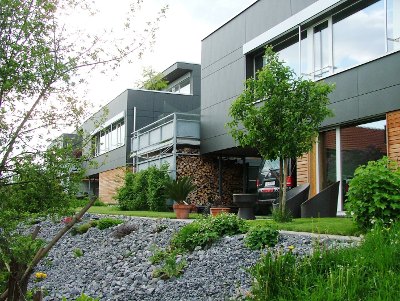For IP professionals
This is the portal for professionals working in the field of intellectual property. Here you'll find direct access to all necessary resources.
Quick links
Marketing with a seal of quality
Guaranteed energy efficiency: how Aarplan Architekten AG put the 'Minergie' mark to use.
With seven employees including apprentices , Aarplan is a small architectural firm with headquarters located on the outskirts of Solothurn's historical part of the city. Its main activity is land and property development using private investment capital. "Energy and ecological sustainability is of primary importance to us in this activity," emphasises managing director Ronald Huber.
But competition is fierce even in the high-standard housing sector, which is why in 2006, Huber established a collaboration with Minergie, an association whose goal is to promote energy efficiency in construction by awarding a seal of quality.
"Since then, we use the label routinely," says Huber. This simplifies communication with potential customers and gives Aarplan an additional sales argument to work with as many banks grant special conditions when constructing a Minergie house.
Aarplan has built dozens of homes and apartments in the past eight years and has had them inspected and approved by Minergie experts, for which Huber has received a certificate for each verifying compliance with the relevant standards. A licencing contract linked to the certificate gives him the right to use the Minergie label on the building that has received it.
It sounds complicated but for Christian Röthenmund, Managing Director of the Minergie Association, it is justifiable because through the certification, there is an object-related relationship between the association and the licensee. "In addition," says Röthenmund, "the so-called individual trade mark allows us a free hand in managing the brand."

This is in contrast to a collective or guarantee trade mark. Here, the certifying organisation needs not only to register the trade mark, but also the conditions of use with the IPI. In the case of a guarantee trade mark, the organisation is obliged to grant rights of use if the conditions are met.
"Our standards have become increasingly stricter over the past years," explains Röthenmund. In addition, new parallel labels have been created: Minergie-Eco reflects not only the energy balance but also the living comfort. And the most recent standard, Minergie-A, will be awarded to buildings that do not consume more energy than they produce.
The licencing fees for Minergie are between CHF 900 and a maximum of CHF 10,000 regardless of the standard or the size of the surface area used. This is not a small amount of money in the construction industry where things are tightly calculated. But meticulous inspection of a building has its price and guarantees the value of the brand, which is currently used by 4,000 companies in the construction industry and associated building trades.
For Aarplan managing director Huber, it makes sense. "And not only just financially," he emphasises. Minergie's specifications are constantly becoming stricter and this is a constant motivation for him and his team to become better.
Aarplan has already built Minergie-P homes – those with an annual consumption of approximately three litres of heating oil per square metre living area. One of these exists in Solothurn and is the company's home. The next step is going to be a Minergie-A project and Ronald Huber is convinced that, "sooner or later, we will win over customers for the zero-energy house as well".
News
20.06.2025 | Media release, Law and policy, Copyright, News
Related right for the media: Federal Council approves dispatch on amended Copyright Act
...more
13.06.2025 | Media release, Designs, News
Federal Council approves international Design Law Treaty
...more
